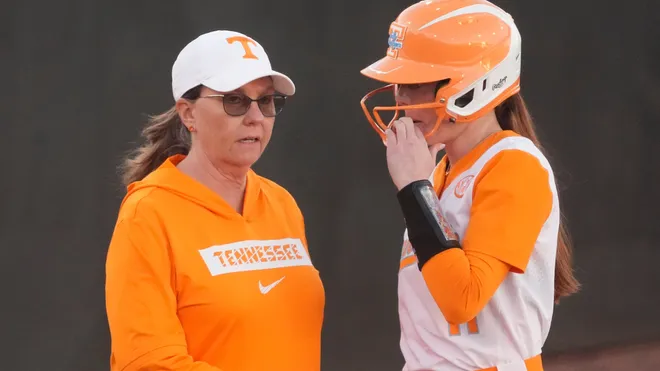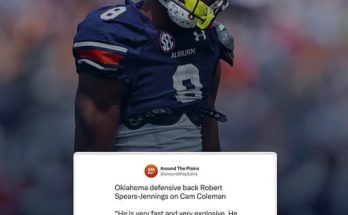In the realm of college softball, moments of controversy are rarely forgotten, especially when they unfold on a national stage with stakes as high as a Women’s College World Series (WCWS) berth. Such was the case when a contentious play during Game 2 of the Knoxville Super Regional between the Tennessee Lady Vols and UCLA Bruins set off a flurry of debate and frustration.
At the center of the storm: UCLA slugger Megan Grant and a critical run that never officially counted.
According to Tennessee head coach Karen Weekly, “Everybody but four people” saw what happened — a statement that now reverberates across the college softball world.
Setting the Scene: Super Regional Showdown in Knoxville
The atmosphere was electric at Sherri Parker Lee Stadium in Knoxville. The Tennessee Lady Vols, a top-seeded powerhouse under Weekly’s leadership, were squaring off against the historic UCLA Bruins in a best-of-three Super Regional. The winner would punch their ticket to the WCWS in Oklahoma City.
After Tennessee took Game 1, UCLA responded with an offensive surge in Game 2. The Bruins jumped out early, applying pressure to the Lady Vols’ pitching staff and testing the defense. That’s when the now-infamous play occurred — a moment in the third inning that changed the tone of the game.
Megan Grant, a junior outfielder known for her speed and clutch hitting, barreled around third base and appeared to score on a line drive to left field. The scoreboard lit up. The crowd groaned. But Karen Weekly wasn’t convinced — and neither were her players.
The Play in Question: Did Grant Miss the Plate?
As the Bruins poured out of the dugout in celebration after the run scored, Tennessee catcher Giulia Koutsoyanopulos sprinted toward home plate and calmly tapped it with the ball in her glove. The umpire called for time.
Weekly, ever the vigilant coach, immediately approached the umpiring crew with a protest: Megan Grant had missed home plate.
“I was watching the whole time,” Weekly later told the media. “You could see clear as day. She never touched it. Our catcher saw it, our dugout saw it, and most of the fans saw it. Everybody but four people saw it.”
Those “four people,” Weekly was referring to, included the umpiring crew and possibly the replay officials responsible for reviewing the play.
The Official Review and Its Aftermath
Under NCAA softball rules, home plate is reviewable, including questions of whether a runner touched the plate. Tennessee’s bench initiated the challenge, and the crew went to the video monitor for review. Tension filled the stadium as replays were broadcast to the ESPN cameras, but not on the in-stadium screen, leaving the crowd in suspense.
After a brief review, the umpires ruled the run would stand — Grant was safe at home.
The decision sent shockwaves through the Tennessee bench. Weekly remained calm but visibly frustrated, raising her arms in disbelief and turning to the fans behind the dugout. The Tennessee faithful erupted into boos, while social media lit up with videos and frame-by-frame breakdowns of the play.
Karen Weekly Speaks Out: “This Can’t Happen in This Moment”
In her post-game press conference, Weekly did not mince words.
“We have replay for a reason. And in this case, we didn’t get it right,” she said. “At this level of play, when a trip to Oklahoma City is on the line, we need to be 100% sure on plays like that. I’ve looked at the footage, and she clearly misses the plate. She leaps over it. It’s not even close.”
Weekly emphasized that her concern wasn’t about placing blame or criticizing players.
“Megan Grant is a great player. I have nothing but respect for her,” Weekly said. “But the integrity of the game has to be protected. Our players work too hard for a missed call to potentially determine the outcome.”
Social Media Frenzy: The Zapruder Tape of Softball
Within minutes of the play, softball fans across the country began dissecting the moment frame by frame. Videos uploaded to Twitter, TikTok, and Instagram appeared to support Weekly’s version of events. One slowed-down clip showed Grant leaping slightly while extending her foot but appearing to miss the front corner of the plate before continuing into the dugout.
The hashtag #MissedThePlate trended on X (formerly Twitter), and prominent analysts weighed in.
ESPN’s Amanda Scarborough, a former All-American pitcher, called it “a textbook case for expanded replay clarity,” while SEC Network’s Kayla Braud tweeted: “Hard to see how this stands. There should be no guesswork with video review.”
UCLA’s Perspective: “We Play to the Whistle”
UCLA head coach Kelly Inouye-Perez was diplomatic in her response.
“I understand emotions run high in these moments,” she said. “From our angle, we saw Megan come around and the umpire made no indication she missed anything. You play until you’re told otherwise.”
Grant, who had already belted two home runs in the series, declined to comment directly on the play but said she was focused on helping her team force Game 3.
“It was a high-energy moment. I just kept running. I did what I was coached to do,” she said.
The Bigger Picture: Replay Limitations and Human Error
The controversial play reignites discussions about replay effectiveness in college softball. The NCAA expanded replay review rules in recent seasons, allowing more plays — including tag-ups, boundary calls, and plate touches — to be reviewed. But execution has not always matched intent.
Multiple coaches have called for a centralized replay system, similar to what’s used in college football or the MLB, where trained officials off-site can review plays with consistency and provide real-time communication with the crew on the field.
“You can’t leave it up to the crew that missed it live to also make the final decision from a small screen behind the dugout,” one anonymous SEC coach told D1Softball. “There’s too much at stake.”
What Happened Next: Tennessee Responds
Whether the controversial run shifted momentum permanently is up for debate, but Tennessee didn’t fold. The Lady Vols mounted a comeback in the late innings of Game 2, with Karlyn Pickens keeping UCLA’s bats quiet and Zaida Puni launching a home run to trim the deficit.
Ultimately, UCLA won Game 2 by a narrow margin, forcing a decisive Game 3.
In Game 3, Tennessee came out with a fire fueled by the previous day’s events. Led by Pickens and a resilient offense, the Lady Vols sealed the series and earned their trip to Oklahoma City — a place that has become familiar under Weekly’s reign.
Fallout and Lessons Learned
The play involving Megan Grant may not have decided the series, but it added a layer of controversy that will be discussed for years to come.
Karen Weekly, never one to shy away from accountability, used the moment to advocate for the sport.
“Let’s get better. Let’s evolve,” she said after the series. “Softball deserves the same integrity and technology that other sports have. Our athletes deserve it. Our fans deserve it.”
The NCAA, when asked for comment, issued a brief statement acknowledging the play was reviewed and the umpiring crew acted according to protocol. They declined to comment further pending a postseason rules committee meeting.
As the Women’s College World Series continues, the spotlight remains on the players and the passion that defines college softball. But moments like the Grant play serve as reminders: the margin for error is razor-thin, and the human element — while part of the game — can sometimes overshadow the athletes’ efforts.
Karen Weekly’s words echo long after the dust settled in Knoxville:
“Everybody but four people saw it.”
And in those few words, she sparked a national conversation.



